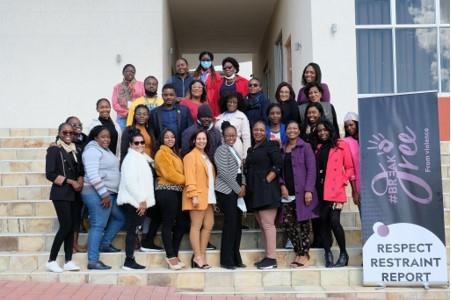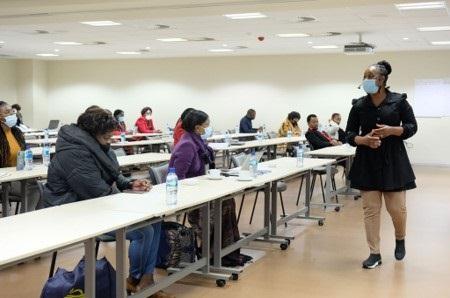#Breakfree trains healthcare professionals on sexual and gender-based violence
#BreakFree Training workshops serve as a call for improved response and prevention, and to upskill service providers on matters related to SGBV.In partnership with NAPPA, #BreakFree hosted a two-day SRHR & SGBV training workshop for 50 healthcare professionals from seven regions, and other service providers from 6 to 7 May 2021 at NIPAM.
In her welcoming remarks, the gender and child specialist at One Economy Foundation, Veronica Theron, explained that the aim of the training was to capacitate healthcare workers to provide quality youth-friendly services, improve SGBV prevention and response services, as well as provide quality and non-judgmental post-abortion treatment and care.
The resource mobilisation and programmes director at NAPPA Namibia, Agatha Kuthedze, began the training with an emphasis on sexual reproductive health and rights where she advocated that women should have choices when it comes to family planning. She outlined the standard of care factors to consider when providing SRH services to youth as information, access, choice safety, privacy, dignity, comfort, continuity and right of opinion.
“Post-exposure prophylaxis (PEP) uses therapeutic agents to prevent infection after exposure to pathogens, while pre-exposure prophylaxis (PrEP) is the use of ARVs by those not infected in order to prevent the acquisition of HIV,” she said.
Franz Kaluhoni, the chief health programme officer for special programmes at MoHSS in Otjiwarongo, gave a presentation on the burden caused by sexually transmitted infections, the features of a syndromic approach to diagnose and treat STIs and demonstrate the skills needed in interviewing and examining STI patients. Key highlights from his presentation included the fact that STIs remain an alarming public health problem in Namibia and that the effective treatment of STIs is a good strategy in the prevention of HIV transmission, as STI’s and HIV share risk factors.
After a fruitful session focused on sexual reproductive health and rights, Day 1 ended with a post-test to evaluate the participants' understanding.
Day 2 of the training placed focus on SGBV and kicked off with a presentation by Ms Mainga, a community liaison officer at Regain Trust. She elaborated on the different types of GBV, the levels at which violence can occur and briefly emphasised the cycle of violence. Mainga further presented case scenarios to broaden the participants’ understanding of the domestic types of violence.
Another eye-opening session for the participants was on the purpose of trafficking of persons which includes sexual exploitation, forced labour, slavery and removal of organs. This was presented by Constance, head social worker and gender specialist at Regain Trust. She shed light on the challenges faced by healthcare workers and other service providers placed at the forefront of SGBV cases.
Veronica Theron, through interactive exercises and case studies, shared the myths and facts centred around GBV, the causes and contributing factors of GBV, the barriers for leaving toxic relationships, as well as the profiles of both the survivors and perpetrators. She further talked about rape and sexual assault, which evoked strong arguments among the participants, especially on the issues of consent and the myth that the dress code of the survivor is a cause of rape.
“The dress code of young girls is a point of concern, especially for men who did not have sex for some time,” was one of the comments made by a female participant.
Inspector Simao from the GBVI Police Unit shared in detail on protection orders, where and when to apply, who can apply and consequences when you contravene the order.
“The training was provided by multi-disciplinary teams that really touched on a lot of insightful information,” said one of participants.






Comments
My Zone
No comments have been left on this article